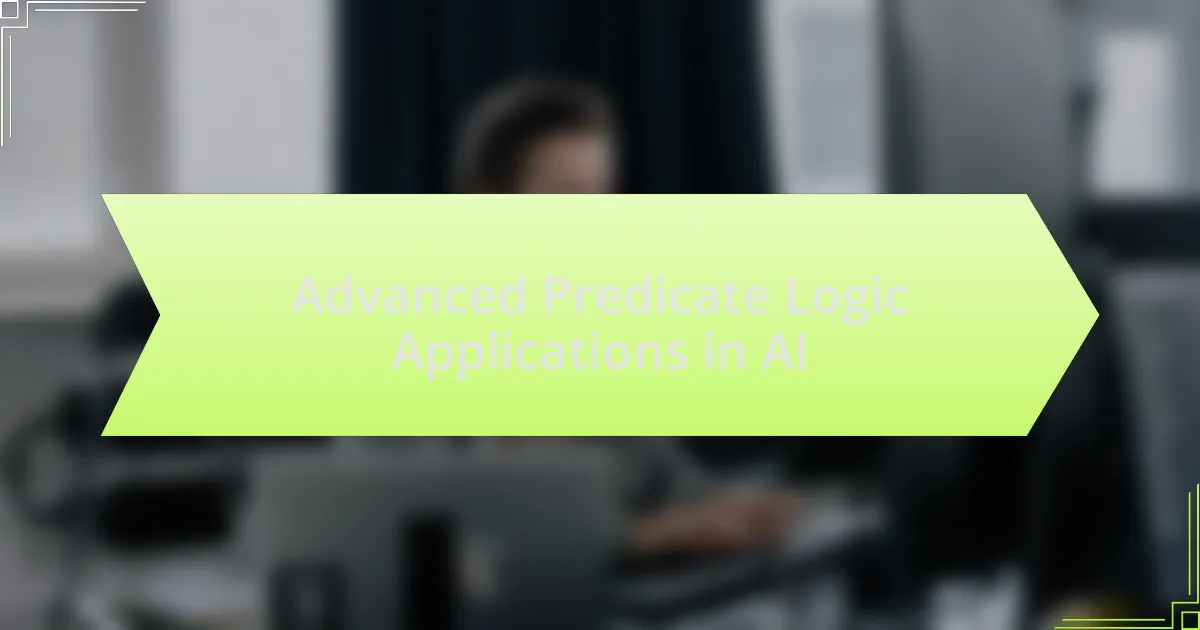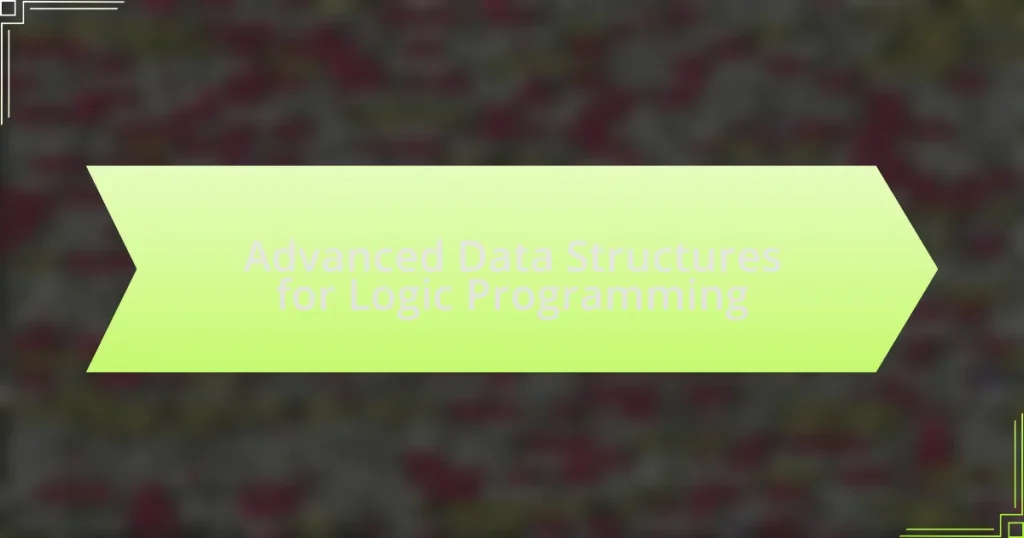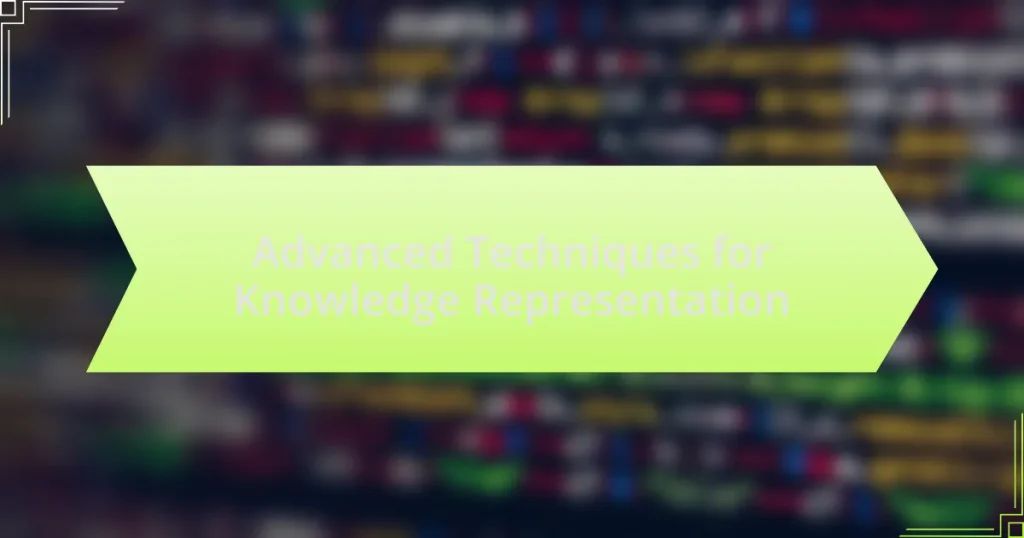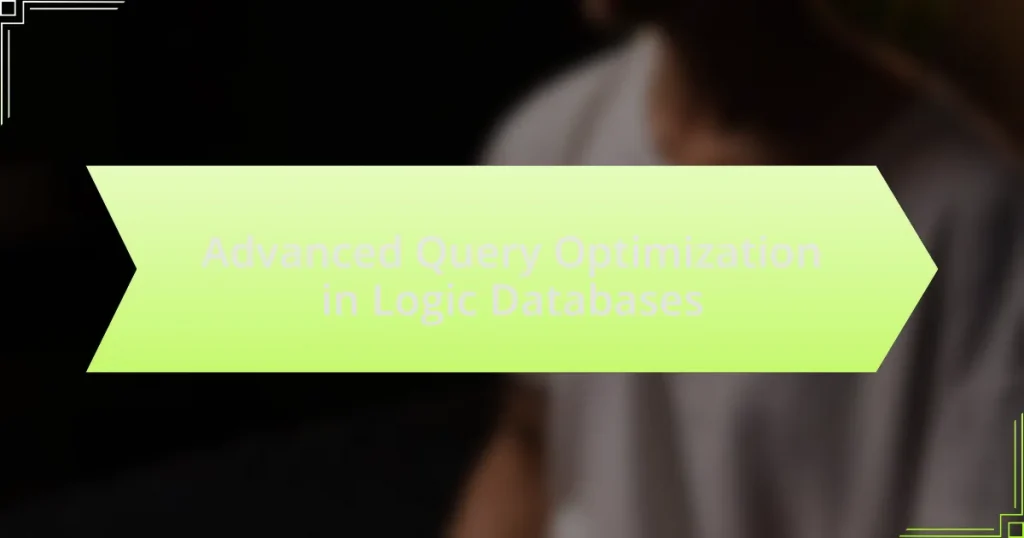Advanced predicate logic is a crucial component in artificial intelligence (AI), facilitating knowledge representation, automated reasoning, and natural language understanding. This article explores how predicate logic enhances AI systems by providing a formal framework for representing complex relationships and enabling precise reasoning. Key principles such as quantifiers and predicates are discussed, along with the differences between predicate and propositional logic. The article also highlights the applications of predicate logic in various AI domains, including natural language processing and knowledge representation, while addressing challenges and future trends in its integration within AI systems.

What are Advanced Predicate Logic Applications in AI?
Advanced predicate logic applications in AI include knowledge representation, automated reasoning, and natural language understanding. Knowledge representation utilizes predicate logic to model complex relationships and facts about the world, enabling AI systems to store and manipulate information effectively. Automated reasoning employs predicate logic to derive conclusions from known facts, facilitating problem-solving and decision-making processes in AI. Natural language understanding leverages predicate logic to interpret and analyze human language, allowing AI to comprehend and generate meaningful responses. These applications are supported by foundational work in formal logic, such as the development of first-order logic, which provides a robust framework for expressing and reasoning about knowledge in AI systems.
How does predicate logic enhance artificial intelligence systems?
Predicate logic enhances artificial intelligence systems by providing a formal framework for representing and reasoning about knowledge. This logical structure allows AI systems to make inferences, draw conclusions, and understand relationships between different entities in a precise manner. For instance, predicate logic enables the representation of complex statements about objects and their properties, facilitating automated reasoning processes such as theorem proving and knowledge representation. Research has shown that systems utilizing predicate logic can effectively solve problems in natural language processing and automated planning, demonstrating its critical role in advancing AI capabilities.
What are the fundamental principles of predicate logic in AI?
The fundamental principles of predicate logic in AI include the use of quantifiers, predicates, and logical connectives to represent and reason about knowledge. Predicate logic extends propositional logic by allowing the expression of statements involving objects and their properties, enabling more complex reasoning. For instance, the universal quantifier (∀) denotes that a statement holds for all instances, while the existential quantifier (∃) indicates that there exists at least one instance for which the statement is true. These principles facilitate the formalization of knowledge representation, allowing AI systems to infer new information from existing knowledge through logical deduction. This capability is essential in applications such as automated theorem proving and natural language understanding, where precise reasoning about relationships and properties is required.
How does predicate logic differ from propositional logic in AI applications?
Predicate logic differs from propositional logic in AI applications by allowing for the representation of relationships and quantifiers, which enables more complex reasoning about objects and their properties. While propositional logic deals with simple true or false statements, predicate logic incorporates predicates that can express statements about variables, such as “All humans are mortal,” allowing for a richer and more nuanced understanding of knowledge. This capability is crucial in AI for tasks like natural language processing and knowledge representation, where understanding the context and relationships between entities is essential for accurate reasoning and decision-making.
What are the key areas where advanced predicate logic is applied in AI?
Advanced predicate logic is applied in AI primarily in knowledge representation, natural language processing, and automated reasoning. In knowledge representation, it enables the formalization of complex relationships and facts about the world, allowing AI systems to reason about them effectively. In natural language processing, advanced predicate logic helps in understanding and generating human language by structuring sentences in a way that captures their meaning accurately. Automated reasoning utilizes predicate logic to derive conclusions from known facts, facilitating problem-solving and decision-making processes in AI systems. These applications demonstrate the foundational role of advanced predicate logic in enhancing AI’s capabilities in understanding and interacting with the world.
How is predicate logic utilized in natural language processing?
Predicate logic is utilized in natural language processing (NLP) to represent and reason about the meanings of sentences. By formalizing the structure of language into logical expressions, NLP systems can better understand relationships between entities, actions, and properties within text. For instance, predicate logic allows for the disambiguation of sentences by breaking them down into quantifiable components, enabling machines to infer meaning and context. This application is supported by research indicating that systems employing predicate logic can improve accuracy in tasks such as semantic parsing and question answering, as demonstrated in studies like “Semantic Parsing with Predicate Logic” by Berant et al., which shows enhanced performance in understanding complex queries.
What role does predicate logic play in knowledge representation?
Predicate logic serves a fundamental role in knowledge representation by providing a formal framework for expressing facts and relationships about the world in a structured manner. This logical system allows for the representation of complex statements involving quantifiers and predicates, enabling machines to infer new knowledge from existing information. For instance, predicate logic can represent statements like “All humans are mortal” and “Socrates is a human,” allowing for the conclusion that “Socrates is mortal.” This capability is crucial in artificial intelligence applications, where reasoning and knowledge inference are essential for tasks such as natural language understanding and automated theorem proving.
Why is advanced predicate logic important for AI development?
Advanced predicate logic is crucial for AI development because it enables machines to understand and manipulate complex relationships and reasoning processes. This form of logic allows AI systems to represent knowledge in a structured way, facilitating tasks such as natural language understanding, automated reasoning, and knowledge representation. For instance, advanced predicate logic supports the development of algorithms that can infer new information from existing data, which is essential for applications like expert systems and decision-making processes. The ability to express statements about objects and their properties in a formalized manner enhances the AI’s capability to perform logical deductions, making it a foundational element in creating intelligent systems that can reason and learn effectively.
How does it improve reasoning capabilities in AI systems?
Advanced predicate logic enhances reasoning capabilities in AI systems by providing a structured framework for representing and manipulating knowledge. This framework allows AI to perform complex reasoning tasks, such as deducing new information from existing facts and resolving ambiguities in data. For instance, systems utilizing predicate logic can apply rules of inference to derive conclusions, which is essential in applications like natural language understanding and automated theorem proving. Research has shown that AI systems employing advanced predicate logic outperform those relying solely on simpler models, as evidenced by studies demonstrating improved accuracy in reasoning tasks across various domains, including medical diagnosis and legal reasoning.
What challenges does predicate logic address in AI applications?
Predicate logic addresses challenges in AI applications such as knowledge representation, reasoning under uncertainty, and the handling of complex relationships. Knowledge representation is crucial as predicate logic allows for the formalization of facts and relationships in a structured manner, enabling AI systems to understand and manipulate information effectively. Reasoning under uncertainty is another challenge, as predicate logic can be extended with probabilistic methods to make inferences even when complete information is not available. Additionally, predicate logic facilitates the modeling of complex relationships among entities, which is essential for tasks like natural language understanding and automated theorem proving. These capabilities are validated by their application in systems like Prolog and knowledge-based AI, where predicate logic forms the backbone of reasoning processes.
How can advanced predicate logic be integrated into AI systems?
Advanced predicate logic can be integrated into AI systems by utilizing it for knowledge representation and reasoning tasks. This integration allows AI systems to process complex relationships and infer new information based on existing data. For instance, systems like Prolog leverage predicate logic to enable automated reasoning, allowing for the development of intelligent agents that can solve problems by applying logical rules. Research has shown that incorporating predicate logic enhances the ability of AI systems to handle uncertainty and ambiguity, as demonstrated in works such as “Logical Foundations of Artificial Intelligence” by John McCarthy, which outlines the foundational role of logic in AI development.
What tools and frameworks support the implementation of predicate logic in AI?
Tools and frameworks that support the implementation of predicate logic in AI include Prolog, OWL (Web Ontology Language), and the Java-based Jena framework. Prolog is a logic programming language specifically designed for AI applications, enabling the representation and manipulation of knowledge through predicate logic. OWL facilitates the creation of ontologies and supports reasoning about the properties of objects and their relationships, making it suitable for semantic web applications. Jena provides a framework for building semantic web and linked data applications, allowing for the integration of predicate logic in knowledge representation and reasoning tasks. These tools are widely recognized in the AI community for their effectiveness in implementing predicate logic.
How can developers ensure effective use of predicate logic in AI projects?
Developers can ensure effective use of predicate logic in AI projects by clearly defining the domain and constraints of the problem they are addressing. This involves specifying the predicates, quantifiers, and logical relationships that accurately represent the knowledge and rules relevant to the AI system. For instance, in natural language processing tasks, developers can utilize predicate logic to formalize the semantics of sentences, enabling better understanding and reasoning capabilities. Research has shown that systems employing well-structured predicate logic frameworks, such as Prolog, can achieve higher accuracy in tasks like theorem proving and knowledge representation, demonstrating the importance of precise logical formulation in AI applications.
What are the future trends in advanced predicate logic applications in AI?
Future trends in advanced predicate logic applications in AI include enhanced reasoning capabilities, improved natural language understanding, and integration with machine learning models. Enhanced reasoning capabilities will allow AI systems to perform more complex logical deductions, enabling applications in automated theorem proving and knowledge representation. Improved natural language understanding will facilitate better interpretation of human language, allowing AI to engage in more sophisticated dialogues and comprehend nuanced meanings. Integration with machine learning models will enable AI to leverage large datasets for training, enhancing the accuracy and efficiency of logical reasoning processes. These trends are supported by ongoing research in areas such as symbolic AI and neural-symbolic integration, which aim to combine the strengths of logical reasoning with data-driven approaches.
How might advancements in predicate logic influence AI research and development?
Advancements in predicate logic can significantly enhance AI research and development by improving reasoning capabilities and enabling more sophisticated knowledge representation. Predicate logic allows for the formalization of complex relationships and properties, which can lead to more accurate inference mechanisms in AI systems. For instance, systems that utilize predicate logic can better handle uncertainty and ambiguity in natural language processing tasks, as demonstrated by research showing that logic-based approaches improve the performance of AI in understanding context and semantics. Furthermore, advancements in automated theorem proving, a key area of predicate logic, can facilitate the development of AI that can autonomously verify and generate new knowledge, thereby accelerating innovation in fields such as automated reasoning and machine learning.
What emerging technologies could benefit from predicate logic in AI?
Emerging technologies that could benefit from predicate logic in AI include natural language processing, automated reasoning systems, and knowledge representation frameworks. Predicate logic enhances natural language processing by enabling more accurate semantic understanding and inference, which is crucial for tasks like machine translation and sentiment analysis. In automated reasoning systems, predicate logic provides a formal structure for deriving conclusions from premises, improving decision-making processes in areas such as robotics and expert systems. Additionally, knowledge representation frameworks utilize predicate logic to model complex relationships and rules, facilitating better data organization and retrieval in domains like semantic web technologies and intelligent agents.
What best practices should be followed when using advanced predicate logic in AI?
When using advanced predicate logic in AI, best practices include ensuring clarity in definitions, maintaining consistency in logical structures, and validating logical expressions through rigorous testing. Clarity in definitions helps prevent ambiguity, which is crucial for accurate reasoning and inference. Consistency in logical structures ensures that the logic applied remains coherent across different scenarios, reducing errors in reasoning. Rigorous testing of logical expressions, such as through model checking or theorem proving, confirms their validity and reliability in practical applications. These practices are supported by research indicating that clear and consistent logic frameworks lead to more robust AI systems, as seen in studies on formal verification methods in AI development.



